Your Guide to Construction, Renovation, and Zoning Laws in North Carolina

North Carolina has several property-related regulations regarding construction, renovation, and zoning that you need to know about before buying or building. According to the NC Office of State Budget and Management, North Carolina has a total of 4.74 million housing units. That figure includes both occupied and vacant units. As impressive as the number is, North Carolina is facing a shortage of about 764,000 units, making new construction imperative.
Property-related laws fall into two general categories: state-level and local (town/city/county/municipality). Each state divides property law responsibilities between these two entities; some laws fall to the state and others to local government. Under each main category, there are many different rules and regulations to review.
State Level (Regulations & Codes)

State-level building regulations are typically focused on building codes and minimum safety standards. Then each individual local government adopts these codes and can strengthen them, but not weaken them. North Carolina building laws are based on the International Code Council (ICC) codes, which are modified and adopted by the state's Building Code Council (BCC).
The BCC also has the authority to create a North Carolina State Building Code that can be more restrictive than the international codes, tailoring them to specific local needs and conditions. The North Carolina Building Code Council interprets, adopts, amends, and enforces the NC State Building Codes as necessary per GS 143-138.
North Carolina lawmakers have recently been criticized for making changes to building regulations that weaken building codes, potentially making homes less safe and more vulnerable to damage during extreme weather events. The North Carolina Homebuilders Association (NCHBA) has pushed for these changes, which is a factor in the weakening of building codes. One example of a weakened code is a new law that limits sheathing inspections to a few coastal counties with high wind speeds.
The OSFM (Office of the State Fire Marshal) provides information on current and past building codes on their website.
North Carolina primarily uses the 2018 edition of the International Building Code (IBC). They have amended these laws to suit the state's needs. The North Carolina building codes in use currently include:
-
2018 Building Code
-
2018 Residential Code
-
2018 Energy Conservation Code
-
2018 Existing Building Code
-
2018 Fire Code
-
2018 Fuel Gas Code
-
2018 Mechanical Code
-
2018 Plumbing Code
-
2018 Electrical Code
Construction

North Carolina construction law primarily governs building permits, contractor licensing, and statutes of limitations for construction-related claims. Most construction work requires permits, which contractors and homeowners must get from local government offices. These construction laws also mandate licensing for contractors on projects exceeding specific amounts, and establish time limits for filing lawsuits related to construction defects and breaches of contract.
Some of the key construction laws in North Carolina include:
-
Permits: North Carolina law requires permits for most construction, alteration, or demolition work. The local inspections department issues these permits.
-
Contractor Licensing: Generally, projects valued at $40,000 or more, and all trade construction (electrical, mechanical, plumbing) regardless of value, require a licensed contractor. There are some exceptions to licensing requirements that are outlined in specific state statutes (N.C.G.S. §§ 87-1, 87-21, and 87-43).
-
Statute of Limitations: North Carolina has a three-year statute of limitations for actions related to contract breaches, negligence, and fraud in construction. This means claims based on construction contracts must be filed within three years of the incident or discovery of the defect, or they may be rejected.
-
Retainage: North Carolina law states that if a general contractor improperly holds retainage or fails to pay subcontractors promptly, they must pay 1% monthly interest on the retainage amount.
-
Construction Defect Claims: Homeowners have the right to pursue claims against builders for defects in new homes. The three-year statute of limitations applies to these claims.
-
Owner as General Contractor: North Carolina allows homeowners to act as their own general contractors under certain conditions: the property must be in their name, it cannot be for rent or sale for one year after completion, and they must meet other specific requirements outlined by the local jurisdiction.
As a whole, North Carolina construction laws are designed to keep people safe and ensure quality and fair dealing regarding construction projects. They regulate who can perform the work, oversee the construction process through permits and inspections, and provide legal recourse for those harmed by construction defects or breaches of contract.
Commercial Structures

The NC Licensing Board for General Contractors issues licenses to contractors. Any North Carolina general contractor working on commercial projects over $30,000 must have a license. Specialty contractors may also need licenses, sometimes requiring both a general contractor's license and a specialized trade license. Building permits are required for most construction work, including new buildings, alterations, and significant structural changes, and each municipality has its own specific requirements. Furthermore, a three-year statute of limitations applies to claims for breach of contract, negligence, and fraud, meaning claims must be filed within three years of the incident.
Some additional commercial construction laws in North Carolina include:
- Statute of Repose: North Carolina has a six-year statute of repose for construction disputes, which protects contractors from lawsuits related to projects from many years ago.
- License Classifications: The NC Licensing Board for General Contractors has various license classifications, including building, residential, highway, and public utilities contractors, with limitations based on the project's value.
- Working Capital and Bonds: The North Carolina Licensing Board for General Contractors also sets requirements for working capital and bond amounts for different license classifications. For example, an unlimited license requires a minimum of $150,000 in working capital or a $1 million bond.
Residential Structures
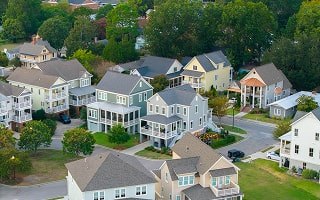
North Carolina bases all residential construction laws on the North Carolina State Building Code, which includes the Residential Code, other regulations, and licensing rules. Specific requirements relate to permits, inspections, contractor licensing, and adherence to the building code itself, which covers areas like structural strength, sanitation, and energy conservation.
Some of the key highlights of North Carolina residential construction law include:
- Building Permits: Most residential construction projects require a building permit. Local governments issue and enforce these laws.
- Inspections: Inspections are conducted during various stages of construction to ensure compliance with the building code.
- Contractor Licensing: General contractors, electrical contractors, and mechanical/plumbing contractors must be licensed by the appropriate state boards.
- Statute of Limitations: North Carolina has a three-year statute of limitations for legal actions related to construction defects like contract breaches, fraud, or negligence.
- Structural Strength: North Carolina has strict laws regarding structural integrity to ensure that buildings can withstand loads and stress even in storm conditions.
- Sanitation: NC sanitation laws require proper plumbing and waste disposal systems.
- Energy Conservation: These laws require insulation, windows, and other features to minimize energy consumption.
- Safety: North Carolina residential construction laws also include provisions to protect against fire, falls, and other hazards.
- Accessibility: New residential buildings must comply with standards for people with disabilities.
- Permit Exceptions: Some projects, like certain minor exterior or interior work (under $15,000 and non-structural) or certain farm buildings, may be exempt from permitting requirements.
- Coastal Construction: Coastal counties may have additional regulations, particularly regarding wind loads and hurricane protection.
House Bill 488 has impacted certain aspects of the building code, such as potentially reducing inspection requirements in some areas.
Safety Standards

The North Carolina State Building Code governs building safety standards, but local jurisdictions enforce them. Safety regulations cover many areas of building construction and alterations, ensuring structural integrity, fire safety, and accessibility. The codes are based on the International Building Code (IBC) with state-specific amendments.
Some of the key aspects of North Carolina safety regulations are:
- Permitting and Inspections: Building permits and inspections are typically required for most construction and renovation projects. Inspections are performed to ensure that builders are complying with North Carolina building codes.
- Structural Integrity: These laws ensure that buildings can withstand loads and stresses that come with extreme weather and incidents.
- Fire Safety: Fire safety laws prevent and control fires and include fire-resistant construction and fire protection systems.
- Means of Egress: These provisions provide safe and adequate exits for occupants during emergencies.
- Accessibility: Some laws ensure that buildings are accessible to people with disabilities. The 2018 North Carolina Building Code includes the 2009 ANSI A117.1 standard for accessibility.
- Mechanical Systems: North Carolina mechanical laws address the safety of heating, ventilation, and air conditioning systems.
- Plumbing Systems: Plumbing code ensures a safe water supply and waste disposal.
- Electrical Systems: These rules cover electrical wiring and equipment to ensure homes and public buildings are safe. North Carolina has adopted the 2020 National Electrical Code (NEC) with amendments for one- and two-family dwellings.
- Energy Conservation: These laws promote energy efficiency in building design and construction.
North Carolina periodically updates the State Building Code to incorporate new technologies, address emerging safety concerns, and align with the latest national model codes.
Building Codes

North Carolina building codes are a set of regulations that govern the construction and maintenance of buildings within the state. The codes are based on national model codes, such as the International Building Code (IBC), and are adopted and amended by the North Carolina Building Code Council (BCC). These codes are enforced by local jurisdictions, ensuring that buildings meet minimum standards for safety, health, and accessibility.
North Carolina's building codes include:
- 2024 North Carolina State Building Code: Existing Building Code
- 2024 North Carolina State Building Code: Mechanical Code
- 2024 North Carolina State Building Code: Administrative Code and Policies
- 2024 North Carolina State Building Code: Building Code
- 2024 North Carolina State Building Code: Fire Prevention Code
- 2024 North Carolina State Building Code: Energy Conservation Code
- 2024 North Carolina State Building Code: Mechanical Code
- 2024 North Carolina State Building Code: Fuel Gas Code
- 2024 North Carolina State Building Code: Plumbing Code
- 2024 North Carolina State Building Code: Residential Code
- 2014 North Carolina Electrical Code Amendments
Asbestos Laws

North Carolina has strict laws governing projects primarily focused on the safe handling and removal of asbestos-containing materials during renovation and demolition. These laws require permits for asbestos removal and notification to the state before demolition, regardless of whether asbestos is present. The state also mandates that employers ensure employee exposure to airborne asbestos fibers remains below specific limits and implements safety measures like personal protective equipment (PPE) and wet methods to minimize hazards.
Some key regulations for asbestos disturbance and removal include:
- Asbestos Removal Permits: When removing more than 35 cubic feet, 160 square feet, or 260 linear feet of regulated asbestos-containing material, contractors must obtain a permit from the Health Hazards Control Unit (HHCU).
- Demolition Notifications: Before performing any demolition, even if asbestos is not present, builders must send a demolition notification to the HHCU.
- OSHA Standards: North Carolina adheres to OSHA's standards for asbestos in the construction industry, including permissible exposure limits (PELs) and requirements for respirators and protective equipment when those limits are exceeded.
- Exposure Limits: The OSHA permissible exposure limit for asbestos is 0.1 f/cc as an 8-hour time-weighted average (TWA), with a 30-minute excursion limit of 1.0 f/cc.
- Abatement Practices: Asbestos abatement, which includes removal, encapsulation, or repair, is a crucial aspect of construction work involving asbestos-containing materials.
- Disclosure Requirements: Property owners are obligated to disclose the presence of asbestos to potential buyers.
- Safe Occupancy: While undisturbed asbestos is generally not a health risk, it is crucial to manage and minimize the risk of disturbance during construction or renovation.
- Safety Surveys: Before any renovation or demolition work, construction crews must conduct an asbestos survey to identify and assess the condition of asbestos-containing materials.
- Intrusive Surveys: Refurbishment or demolition projects may require more in-depth surveys to locate hidden asbestos. Surveyors should be able to safely access all areas, including service ducts, lift shafts, and basements.
- Wet Methods: Abatement professionals must use wet methods during asbestos removal to control dust and minimize airborne fiber release.
- Regulated Areas: When asbestos levels exceed permissible limits, construction personnel must regulate these areas with signage and restricted access.
- Written Compliance Plans: Employers must develop written compliance plans to address asbestos hazards when exposures exceed the TWA.
Contractor Licensing Laws

For construction projects valued at $30,000 or more, North Carolina requires a contractor's license. This applies to both general construction and specialized trades like electrical, mechanical, and plumbing. The North Carolina Licensing Board for General Contractors (NCLBGC) issues licenses for general contractors, while other state boards oversee specific trades.
Some key points about contractor licensing include:
- General Contractors: A license is needed for all projects exceeding $30,000.
- Specialized Trades: Trade contractors (electrical, mechanical, plumbing) require licenses regardless of the total price.
- Exemptions: There are some exemptions, such as when an owner acts as their own general contractor for their personal residence, provided they meet certain conditions; no license is required.
- Licensing Board: The NCLBGC handles general contractor licenses, while the State Board of Examiners of Electrical Contractors handles electrical licenses.
- Discipline: The NCLBGC has the power to discipline contractors for violations of state laws or ethical standards.
- Independent Contractors: North Carolina uses common law to determine independent contractor status.
Insurance & Bonds
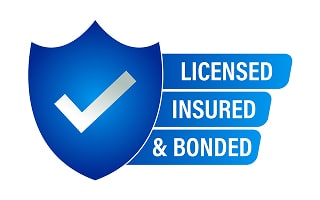
Contractors working in North Carolina are required to carry various types of insurance. For example, professional liability insurance with limits of at least $1,000,000 per occurrence and at least $3,000,000 in the aggregate. If the contractor has employees, they must carry workers' compensation insurance according to state laws. Additionally, they must have employer liability insurance with minimum limits of $500,000.00, covering all of the contractor's employees who are engaged in any work under the contract. Construction companies must also carry commercial liability insurance with a minimum combined single limit of $1,000,000.00 for each occurrence. Contractors who use vehicles to carry out the contract must have automobile liability insurance with a combined single limit of $500,000.00 for bodily injury and property damage; a limit of $500,000.00 for uninsured/underinsured motorist coverage; and a limit of $2,000.00 for medical payment coverage.
In addition to needing a license to perform any work over $30,000 (over 12 months), contractors must also have a surety bond. Depending on the size of the project, North Carolina general contractors must carry one of three bonds: a limited license bond ($175,000), an intermediary license ($500,000), or an unlimited license ($1,000,000). Contractors only pay a fraction of these totals.
Public Works Contracts/Public Bidding

North Carolina public works contracts are governed by specific laws and regulations aimed at ensuring a fair bidding process, proper execution, and public accountability. Some examples of public works projects in North Carolina include transportation projects like road and bridge construction and maintenance, as well as water and sewer system improvements. Parks and recreation projects, such as the development of new parks, trails, and recreational facilities, also fall under the umbrella of public works. Additionally, public buildings like schools, libraries, and government facilities are often part of public works initiatives.
Some highlights of public works contract regulations include:
-
Licensing and Regulation: The North Carolina Licensing Board for General Contractors oversees licensing and regulation of contractors, ensuring they meet specific standards and qualifications.
-
Bidding and Awarding: Most North Carolina public works contracts involve competitive bidding processes, with specific requirements for advertising, submission of bids, and awarding contracts.
-
Contractual Terms: North Carolina law dictates specific requirements for public works contracts, such as the prohibition of clauses mandating litigation or arbitration in another state.
-
Statutes of Repose: A statute of repose limits the time frame within which a contractor or property owner can be sued for construction defects or disputes. In North Carolina, this is typically six years from the start of the dispute.
-
Contractor's Rights: Public works contracts may have specific provisions regarding the contractor's rights, including payment terms, change orders, and dispute resolution procedures.
-
Public Accountability: Public works contracts are subject to public oversight and accountability, ensuring transparency and proper use of public funds.
Renovations

In North Carolina, building permits are generally required for any construction or renovation work that is structural in nature, or for non-structural work exceeding a certain cost threshold. For example, permits are needed for work on load-bearing walls, adding new structures, and for electrical, plumbing, and mechanical work. Minor repairs or replacements, like replacing a window with the same size in the same location, may not require a permit. It's always best to check with the local building inspections department to determine if a permit is needed for a specific project.
Other things that require a permit include adding a deck, building a new structure like a garage or shed, replacing a load-bearing wall, or installing a new HVAC system. Replacing windows with the same size in the same location, replacing a water heater with the same capacity and fuel source, and repairing non-load-bearing walls do not require building permits.
In some areas, any work costing more than $20,000 for renovations requires a building permit.
If a general contractor will be working on a project worth $30,000 or more in 12 months, they must be licensed. Handyman professionals are restricted from performing certain types of work, such as electrical, HVAC, structural, or plumbing work, without the appropriate licenses.
Residential projects typically do not require an architect, but complex or large projects might need one.
Environmental Laws

North Carolina construction projects are subject to both state and federal environmental laws and regulations designed to minimize the impact of construction activities on the environment, including air and water quality, soil contamination, and waste management.
Some of the governing North Carolina environmental laws include:
- North Carolina State Environmental Policy Act (SEPA): This act, found in Chapter 113A of the North Carolina General Statutes, encourages the wise use of natural resources and requires state and local agencies to consider environmental impacts when making decisions, including permitting for private projects.
- Clean Water Act: This federal law regulates water pollution, including stormwater runoff from construction sites. Construction projects must obtain permits and implement measures to prevent sediment and other pollutants from entering waterways.
- Clean Air Act: This federal law regulates air emissions. Construction activities, such as dust and equipment emissions, must comply with regulations to minimize air pollution.
- Solid Waste Management Regulations: North Carolina has regulations for managing construction and demolition debris. These regulations are to minimize waste sent to landfills and encourage recycling and reuse of materials.
- Endangered Species Act: This federal law protects endangered and threatened species. Construction projects near critical habitats may require consultation with the US Fish and Wildlife Service.
- Building Codes: While primarily focused on safety, North Carolina's building codes also address energy efficiency and other environmental considerations.
Some key aspects of environmental laws in North Carolina include:
- Compliance and Permitting: Many construction activities require various environmental permits from state and local agencies. These permits may address stormwater management, erosion and sediment control, air emissions, and waste management.
- Environmental Impact Assessments: SEPA and other regulations may require environmental impact assessments (EIAs) for specific projects to evaluate potential environmental effects and identify mitigation measures.
- Best Management Practices: Construction projects are expected to implement best management practices (BMPs) to minimize environmental impacts. These practices may include erosion and sediment control measures, stormwater management systems, and waste reduction strategies.
- Enforcement and Penalties: State and federal agencies have the authority to inspect construction sites, investigate violations, and issue penalties for non-compliance with environmental regulations. Penalties can include fines, stop-work orders, and requirements to correct the violations.
Solar Regulations

North Carolina has regulations governing solar energy, including requirements for utility-scale solar projects and registration with the NC Department of Environmental Quality (NCDEQ). Homeowners also have rights regarding solar panel installations, even within Homeowners Associations (HOAs), and there are specific guidelines regarding permits and interconnection with the utility grid.
Some of the specific details of North Carolina solar regulations include:
-
Utility-Scale Solar Projects: New, rebuilt, or expanded utility-scale solar projects must register with the NCDEQ. Registration is required by November 1, 2025, or at least 90 days before construction begins. This registration must be updated with the NCDEQ every five years.
-
Residential Solar: Even if homeowners' HOA or deed restrictions limit solar installations, North Carolina protects these property owners' rights to switch to solar energy. Additionally, city ordinances cannot prohibit or restrict the installation of solar collectors on detached single-family residences. Homeowners generally need to obtain two permits: one for the installation and another for interconnection with the utility grid.
-
Net Metering: Duke Energy has changed its net metering plan regarding how much it pays for solar energy uploaded to the grid. These changes are being challenged in court.
-
Fixed Grid Fee: Residential solar users must also pay a fixed grid access fee for solar systems larger than 15 kilowatts, in addition to regular energy charges.
-
Federal Solar Tax Credit: Solar customers can take advantage of a federal solar tax credit, which can cover up to 30% of the installation costs.
-
North Carolina has a Renewable Energy Portfolio Standard (REPS): North Carolina requires utilities to obtain a certain percentage of their energy from renewable sources
-
Incentives: North Carolina also has other incentives and programs, such as net metering and property tax exemptions, that promote solar energy adoption.
Gas/Oil

North Carolina regulations for gas and oil heating systems vary based on the type of system, its size, and whether it's new or existing. Requirements can include tune-ups, tracking and reporting obligations, and facility energy assessments. Specific rules may apply to used oil storage and burning, especially for off-specification used oil. Building permits are generally required for installing or extending plumbing systems, including heating systems, with some exceptions for one-or two-family dwellings when replacing a water heater under specific conditions.
Some key North Carolina gas/oil heating system regulations include:
-
Boiler Regulations: Regulations for boilers depend on the construction date, fuel type, and size. They may include biannual tune-ups, tracking and reporting obligations, and one-time facility energy assessments.
-
Used Oil Management: If burning off-specification used oil, specific regulations apply to storage units (containers, tanks) and must meet specific conditions (good condition, no leaks, secondary containment).
-
Building Permits: Generally, building permits are required for installing or extending plumbing systems, including heating systems.
-
One-and Two-Family Dwelling Exceptions: A permit is not required for the connection of a water heater being replaced in a one- or two-family dwelling if the work is performed by a licensed professional who personally inspects the work.
-
National Emission Standards for Hazardous Air Pollutants (NESHAP): For certain boilers, NESHAP regulations may apply, requiring initial compliance demonstrations (stack testing) and ongoing performance testing and reporting.
-
Storage: Used oil may only be stored in containers, tanks, and other units subject to regulations under 40 CFR 264 and 265.
-
Unit Condition: Containers and above-ground tanks used to store and process used oil must be in good condition (no severe rusting, defects, or deterioration) and not leaking.
-
Secondary Containment: A secondary containment system (e.g., berms, liners) is required to prevent released used oil from migrating to the environment.
-
EPA Reporting: For certain boilers subject to NESHAP regulations, facilities must submit performance test data to EPA's Central Data Exchange (CDX).
Electricity

North Carolina's electrical regulations for construction primarily involve following the National Electrical Code (NEC) along with the state-specific amendments. Electrical work generally requires a permit and inspections, though homeowners can perform wiring in their own residences under certain conditions. The North Carolina State Board of Examiners of Electrical Contractors (NCBEEC) issues licenses for electrical work.
Homeowners are permitted to do their own electrical wiring in their primary residence, provided they will personally live there and the work is not for rent or sale within one year of completion.
The 2018 North Carolina State Building Code (which is being updated, but this section likely remains relevant) requires a minimum working space in front of electrical service equipment, including a width of 30 inches, a depth of 36 inches, and a height of 78 inches.
The current suite of 2018 North Carolina State Building Codes will remain in effect through June 30, 2025.
The NC Office of State Fire Marshal (OSFM) website provides information on the North Carolina State Building Code, including the electrical code and updates.
Government Housing Programs
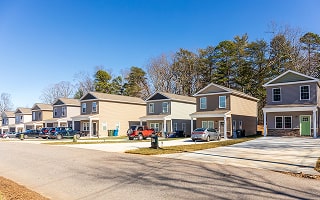
North Carolina has several government-funded housing programs that provide assistance to individuals and families with housing needs. These programs include emergency solutions grants, permanent supportive housing, and public housing, among others. Organizations like NC 211 and the NC Housing Finance Agency (NCHFA) help connect people with these resources.
Some of the government housing programs in North Carolina include:
- Emergency Solutions Grant (ESG): This program assists individuals and families experiencing homelessness, including rapid re-housing and rental assistance.
- NC 211: A valuable resource for finding emergency housing, shelters, and other support services is NC 211. Those in need can reach them by calling 2-1-1 or visiting their website, NC 211.
- Rapid Re-Housing: This program helps individuals and families move quickly from shelters or homelessness into permanent housing, with support like rental assistance.
- Permanent Supportive Housing: This program is designed to help adults with disabilities who face barriers to independent living, providing access to affordable housing and support services.
- Public Housing: Managed by local Public Housing Authorities (PHAs), public housing offers subsidized rental housing based on income and family size.
- NCHFA Programs: The NC Housing Finance Agency (NCHFA) offers various programs, including homeownership assistance and down payment assistance.
- Local Management Entities/Managed Care Organizations (LME/MCOs): Those who need assistance with paying rent can contact their local LME/MCO, which may be able to help.
Property Tax Credits and Incentives
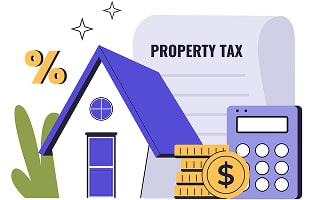
Property taxes everywhere are climbing, and some individuals or families cannot afford them. The state of North Carolina offers some relief in the form of property tax credits or incentives. These tax breaks can reduce the assessed value of the home, thus lowering the tax burden. Some available property tax credits/exemptions in North Carolina are:
- Circuit Breaker Homestead Exclusion
- Builder Property Tax Exemptions
- Disabled Homestead Exclusion
- Disabled Veteran Property Tax Homestead Exclusion
- Elderly Homestead Exclusion
- Historic Properties
- Present Use Value Exclusion
- Religious Uses Exemption
The North Carolina Department of Revenue offers an application to apply for property tax relief. Download the application, complete it, and return it to your local county tax assessor's office to submit and then wait for approval.
Local Level (Permits and Regulations)
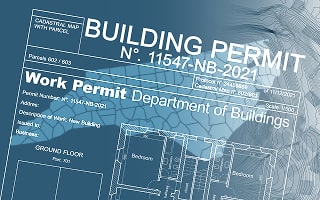
Building codes, safety standards, and other construction/renovation laws are issued at the state level. These laws are adopted by local governments (cities/towns/counties), and they are responsible for enforcing them through building permits and inspections.
In North Carolina, building permits are generally required for most construction, alteration, repair work, movement, or demolition of buildings or structures, including electrical, mechanical, and plumbing work.
Some work does not require a building permit, such as wallpapering, painting, certain fence and accessory building construction, and particular non-structural interior and exterior work.
Building-Friendly Areas of North Carolina
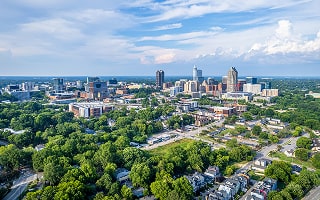
Although no specific areas of North Carolina are known for "easier" building and less strict laws, some regions do have fewer zoning restrictions or permit requirements, making it easier to build new homes or renovate existing ones. Generally, rural areas and those with less density tend to have fewer regulations compared to urban regions. Research the specific zoning and building codes for any location before beginning construction.
Regardless of the laws, North Carolina offers many areas that are great for building near major cities with newly planned communities. Raleigh, Charlotte, and the Research Triangle region are popular for new construction, with neighborhoods like Wendell Falls, which provide abundant amenities close to big cities. For a more suburban feel, Apex and Morrisville are also great options, known for family-friendly environments and safety. Additionally, Lake Norman offers a waterfront lifestyle with various recreational activities.
For families interested in homesteading, Clay County may be an easier place to obtain building permits, especially for those utilizing well water.
Where to Obtain North Carolina Building Permits

Building permits are handled by local governments, typically city or county building departments. Since most new construction and renovations require them, it's essential to know where they are and how to apply for them. The general process for applying for a North Carolina building permit is:
- Identify Your Jurisdiction: Determine whether your project falls under city or county jurisdiction. You can often find this information by searching your address on your local government's website.
- Locate the Specific Department: Check the city's website for departments like "Inspections", "Building Permits", or "Code Enforcement". Look for departments like "Inspections & Permits" or "Central Permitting" within your county government.
- Contact the Building Department: Contact the department directly to inquire about specific permit requirements for your project. Many local governments have websites with detailed information on permits, including application forms, fees, and required documentation.
- Understand the Permit Types: Permits are generally required for new construction, additions, alterations, and certain repairs. Electrical, plumbing, and mechanical permits are typically required for any work involving these systems, including installation, repair, or modification. Other permits may be required for demolition, signs, swimming pools, or projects within a floodplain.
- Gather Details: You'll likely need to provide details about your project, including the scope of work, cost, location, and property information. Depending on the complexity of the project, you may need to submit building plans, foundation plans, and other drawings. Your project may require zoning approval or a floodplain development permit, depending on the location and nature of the work.
- Apply and Pay the Fees: Follow the application process outlined by your local government, which may involve online submissions, in-person applications, or a combination. Be prepared to pay any associated permit fees.
- Schedule an Inspection: After approval, schedule your first building inspection to ensure the work complies with local building codes.
Some links to other building departments in North Carolina include:
- Buncombe County Permits and Inspections
- Cumberland County Building Inspections and Permitting
- Dare County Building Permits and Inspections
- Davidson County Inspections/Central Permitting
- Durham, NC Building and Safety
- Lincoln County Building Permits
- Mecklenburg County Permitting
- New Hanover County Permits and Inspections
- Rockingham County Permitting and Inspections
- Wake County Inspections and Permits
During the permitting process, the building inspector must inspect the work being performed. They may do this before, during, and after the project to ensure the work complies with all local building codes to keep people safe. Depending on the city or county's rules, you may schedule your inspections through the online portal, by phone, or by email.
Zoning Laws

Zoning laws in North Carolina dictate how land can be used within a community, establishing different zones for residential, commercial, and industrial areas, among others. These laws also determine the types of structures allowed, their size, shape, and location. Zoning is to ensure a cohesive neighborhood layout and protect property values by regulating land use.
Some additional details about zoning laws in North Carolina include:
-
Purpose: Zoning laws are designed to regulate land use, ensuring a mix of different types of development while maintaining the character of neighborhoods.
-
Zoning Districts: These are specific areas with defined regulations for land use. Common examples include residential, commercial, and industrial districts. Zoning dictates what types of activities are permitted in each district, such as single-family homes, apartments, or businesses. Zoning also sets standards for building size, height, setbacks (distance from property lines), and other physical characteristics.
-
Impact on Farmers: North Carolina farmers must also abide by zoning regulations with agricultural zoning districts (A/R zoning) that allow farming activities in residential neighborhoods.
-
Spot Zoning: This refers to the rezoning of a specific parcel of land to benefit a particular individual or entity, and can be a point of contention, especially if it deviates significantly from surrounding zoning.
-
Enforcement: Zoning ordinances are typically enforced by local governments through building permits and inspections.
To fight a zoning ordinance in North Carolina, property owners can request a variance, challenge the zoning law, or file a lawsuit. However, these issues can be time-consuming and complex.
Some of the zoning designations used for land throughout North Carolina include:
Residential
- Single-Family: Designed for detached houses, often at lower densities.
- Multi-Family: Allows for apartments, townhouses, and other attached dwellings.
- High-Density: Typically includes larger apartment complexes and condominiums.
- R-15 Residential District: Specifically for moderate density single-family detached dwellings, often requiring public utilities.
Commercial
- Retail: Includes stores, shops, and shopping centers.
- Office: Allows for office buildings and business centers.
Industrial
- I-I District: A specific industrial district in Wake County.
- Airport-II District (AD-2): In Wake County, it allows for a wide range of industrial, commercial, agricultural, and other nonresidential uses.
Other
- Agricultural-Residential (AR): In Johnston County, it allows for single and two-family housing and farming uses.
- Highway District (HD): In Wake County, a specific highway district.
- Classic Mixed-Use (CMU) Districts: In Wake County, allows for a mix of uses.
- Special Highway Overlay District: In Wake County, a special overlay district.
- Resource Conservation Overlay District (RCOD-1, RCOD-2): In Wake County, it designates areas for conservation.
- A-1, Agricultural District: In Pasquotank County, it defines large, open land areas.
Related Links and Enforcement Offices
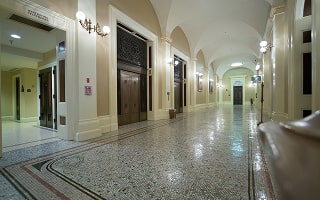
When it comes to North Carolina construction, renovation, building, and housing regulations, many government departments and agencies standardize, regulate, and enforce building rules. There is some overlap with their duties, but most in North Carolina are on the local level. The state agencies tend to set broad minimum standards, and then the cities, towns, and counties customize and adopt from there.
The links below provide detailed information on the state's construction, zoning, renovating, and housing rules.
Other Helpful Links
- North Carolina Building Code Council (BCC)
- North Carolina Homebuilders Association
- NC Licensing Board for General Contractors
- North Carolina Department of Health and Human Services
- North Carolina Licensing Board for General Contractors (NCLBGC)
- Office of the State Fire Marshall
- North Carolina Building Codes
- North Carolina State Board of Examiners of Electrical Contractors
- North Carolina State Environmental Policy Act (SEPA)
- Clean Water Act
- Endangered Species Act
- National Emission Standards for Hazardous Air Pollutants (NESHAP):
- NC Housing Finance Agency (NCHFA)